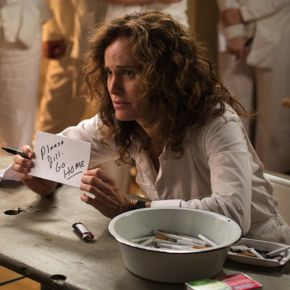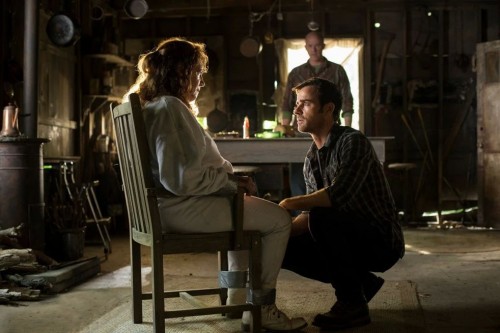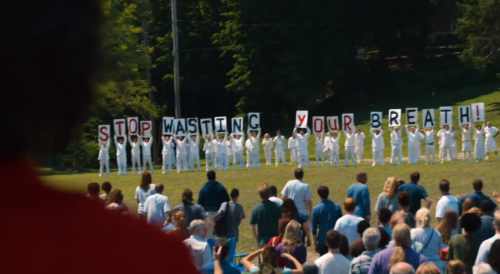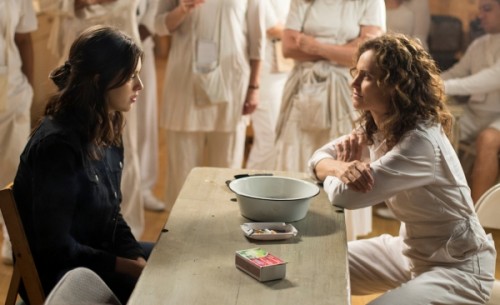
In Gene Wolfe’s Book of the New Sun, a young man named Severian works as a torturer, and in one scene, he helps administer the torturers’ most mysterious and sacred device: the revolutionary. After having gone through it, the victim says, “I thought I saw my worst enemy, a kind of demon. And it was me…” She will spend the rest of her life – about a month – vying with the long-dormant specter of evil, newly-awakened within her, wrestling it as it slowly takes control of her body. Wolfe’s brutal justice is reminiscent of Dante: the source of her tormenting punishment is the evil within her, within everyone.
Chief Garvey, the everyman lynchpin of The Leftovers, fights with a similar shadow inside of him, the thing which abducted Patti, beat her, and dragged her out to an abandoned shack in New York with the intention of killing her. The wilderness setting in the (brilliant) episode 8 was no coincidence; as in Golding’s Lord of the Flies, freedom from the restraints and expectations and consequences of civilized society allow the ultimate drama – Faulkner’s “human heart in conflict with itself” – space in which to unfold.
Among the season’s many tensions, the contrast between day and night stands out: Gladys is stoned at night, the rioting and fires of yesterday’s episode take advantage of the night, and the Reverend gambled and beat a man (if the show’s biology and physics are true-to-life) to death at night. What makes night the site of drama, intrigue, and evil? As Craig Koslofsky writes in his work on Evening’s Empire, “The night fascinated (and continues to fascinate) because one could move in the blink of an eye from the most legitimate and respectable locations in this nocturnal matrix to a far more disorderly, vulnerable, or exciting position.” So high was the potential for upheaval, disorder, and moral transition, that it was illegal in many places to walk without a light during the night. People needed to know where you stand, that you have nothing to hide.
It’s become clear that the shadow within the Chief, his suppressed desperation and rage, work within the night. He moves from the epitome of order as Chief of Police to the morally uncertain, threatening figure of nightwalker. Writing about Genesis, Augustine said that night “consists in darkness which is well ordered.” For the Chief, the only order is that imposed by his id; God may have ordered darkness majestically, but Kevin Garvey orders it only by those of his desires which are too dis-ordered to walk in the light of day. As Jesus said at a nocturnal meeting, “all who do evil hate the light and do not come to the light, so that their deeds may not be exposed.”
Strangely enough, in this sense, the Guilty Remnant have served as agents of exposure. Nora reposes in the refuge from the world provided by sleep, and then she walks downstairs to find, stark in their unreality, the thing she’s been repressing, right there at the breakfast table. In light of having to truly reckon with the disappearances, again, Nora sees Holy Wayne’s cure for what we suspected it was: “a shortcut” to healing. Similarly, Patti cuts her throat just to keep from letting the Chief off the hook. In the daylight, he wanted to return to town and turn himself in, but Patti will not let him atone for his abduction so easily.
But the Guilty Remnant’s ideology stems from repressions of its own. Kierkegaard described an attitude of “infinite resignation” which might be the best understandable response to one’s suffering. Infinite resignation view pleasures and hopes and consolations as already forfeit, thus walling us in from expecting too much from life or being disappointed by it. In his Fear and Trembling, he claims that the faith of Abraham consisted of going a step further – daring to hope amidst hopelessness, “God himself will provide the sacrifice.”
Not incidentally, the Reverend is the one who takes suffering as seriously as the Remnant does, yet he still hopes. He still bathes and kisses his wife though there is no chance of her coming out of her coma; he engages where emotional disengagement would be the most practical response. He hopes to help the Remnant and to help to Chief.
Shakespeare said that “the truth will out”, and the truth about ourselves is by no means an exception. Thoughts we avoid and memories we repress come to us during dreams as we sleep or fears as we lie sleepless. The Chief’s desperate attempts to keep law and order – in the town, his family, and his personal life – create the bifurcation between his conduct in the day and his somnambulance at night. The sleeping pills (ambien?) symbolize this, his need for order making him spiral into disorder. The deeds of darkness, the exposure of which he fears, come out as he watches Patti die. How will he reconcile the two? Perrotta’s and Lindelof’s instincts are dead-on: the minister will show him that even his darkest impulses may be vocalized before God; not a single thought or action is excluded from Him. Thus the Chief has him read:
But if I go to the east, he is not there;
if I go to the west, I do not find him.
When he is at work in the north, I do not see him;
when he turns to the south, I catch no glimpse of him.
But he knows the way that I take;
when he has tested me, I will come forth as gold.
My feet have closely followed his steps;
I have kept to his way without turning aside.
I have not departed from the commands of his lips;
I have treasured the words of his mouth more than my daily bread.But he stands alone, and who can oppose him?
He does whatever he pleases.
He carries out his decree against me,
and many such plans he still has in store.
That is why I am terrified before him;
when I think of all this, I fear him.
God has made my heart faint;
the Almighty has terrified me.
Yet I am not silenced by the darkness,
by the thick darkness that covers my face.
The very act of writing and reading this passage from Job affirms the truth of its final couplet: we are not silenced because the Lord hears us; even when “we do not pray as we ought”, the Spirit still intercedes in groans; before God, nothing is too shameful to articulate. And so the Chief speaks, finally, about his affair and about how much he wanted out from his marriage and family. Confession has happened, and his secret thoughts are coming into the light. They can be exposed because the Reverend is a figure of grace, one who will not judge him as the Chief judges himself.
Speaking becomes the final theme of the season, where silence reigned for so long. Wayne admits he may be a fraud, the Chief formulates, if internally, the wish to have his family back together, and Laurie’s love for her daughter breaks through her resignation: “JILL!”
Fittingly, the note of hope ends the season on a sunny morning, despite the brutal riots the night before. Garvey and Jill walk hand-in-hand, Laurie and her son meet by the water, the wild dog returns tamed, and Nora finds new life in an orphaned child. Many questions remain unanswered, but the tonal shift and movements of repentance and reconciliation in the characters show what it means to feel hope and love in the midst of chaos.
Strays (episode):
-The dog’s back! Money for the chief from winning the bet, and maybe they can stop shooting them.
-Best acting moment: did anyone else notice Jill’s face as she looks up at Nora holding a random baby on their porch? A perfect mixture of “wtf” and amused “what a weird day”-ness.
-Best Gospel moment: Kevin washes away the blood on his hands (and arms, and face) with the Reverend’s water.
-Runner-up: The Chief feared that the Reverend had an agenda, was doing a bait-and-switch and would use his kindness to turn on him – “I’m sorry, but this was the only way.” Instead, he stops the car for a cheeseburger.
-Weirdest moment: kind of like choosing “biggest plot disappointment in Thrones“; there’s just too much there. But Patti’s “wake the f* up” as she straddles Kevin would certainly be a contender.
-The title: “The Prodigal Son Returns”. The reference certainly works for Kevin’s son, for Laurie, for Jill, and for Kevin. But I like the Laurie reading best: she’s not made the decision to fully return yet, but her repudiation of her family at least shows signs of softening.
-Holy Wayne is dead, which I’m kind of happy about, because I was getting tired of speculating about him. But there’s been too much airtime spent on him with too little payoff, so I wouldn’t too be surprised if next season flashes forward a few years, giving his children time to grow up. A flash-forward next season would also spare the writers the awkward choice between reneging on the reconciliation they’ve offered and getting rid of the personal conflicts that drive the story. But nothing’s anywhere near predictable in this series.

COMMENTS
Leave a Reply















